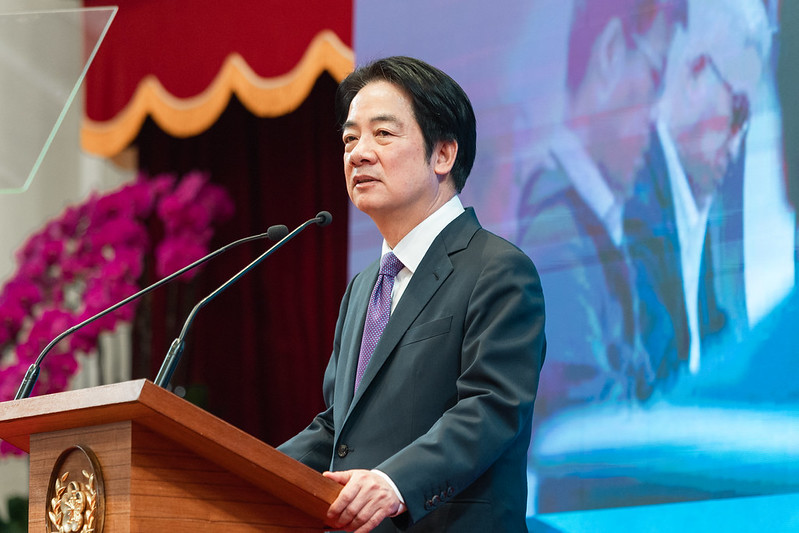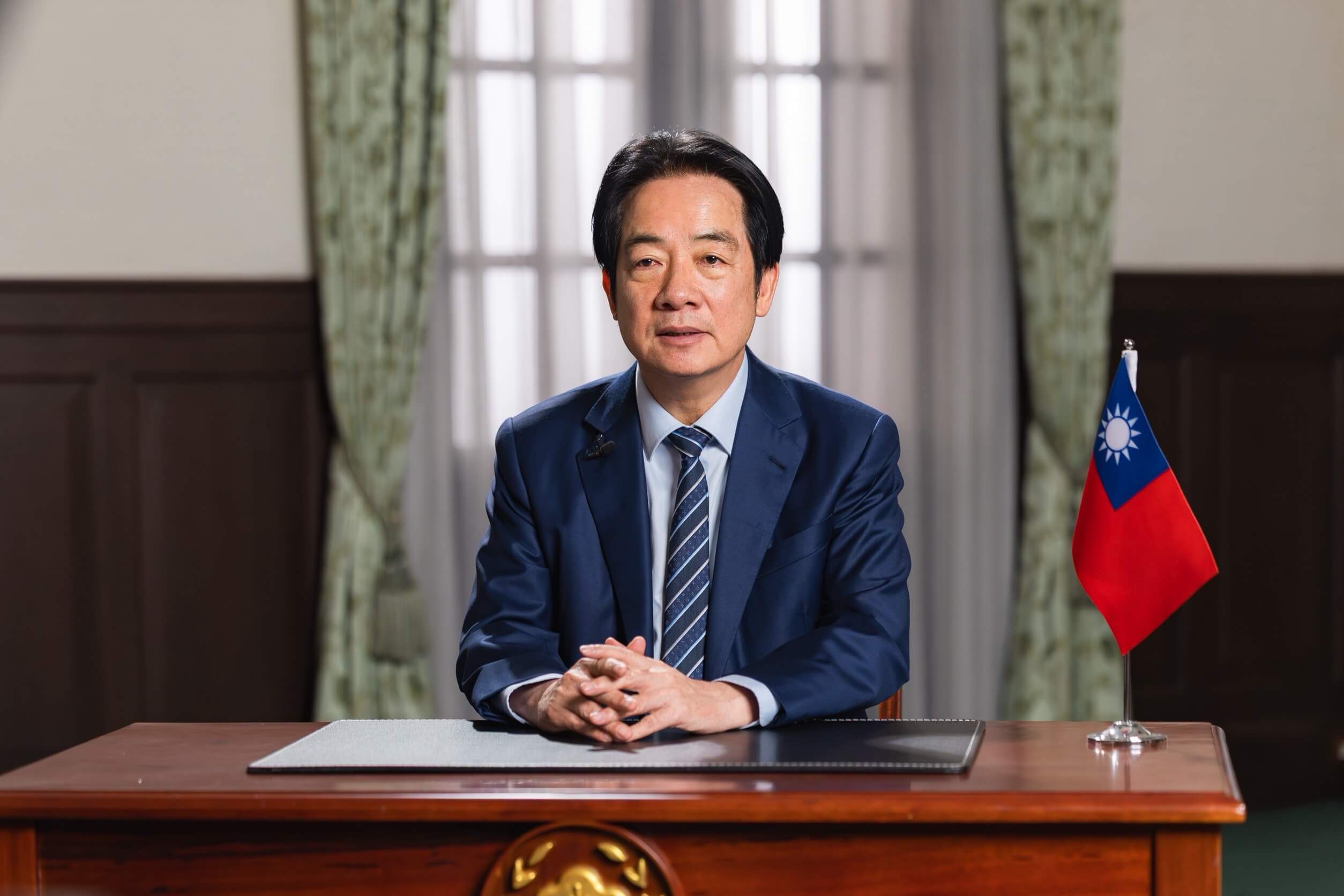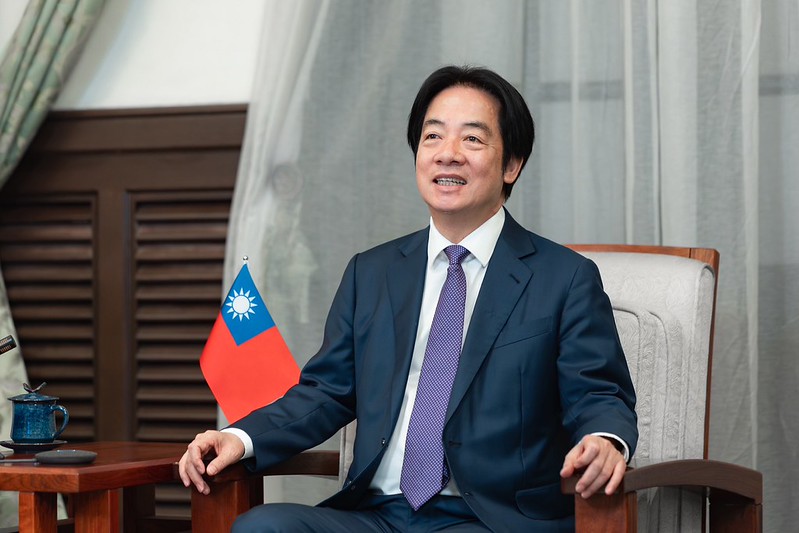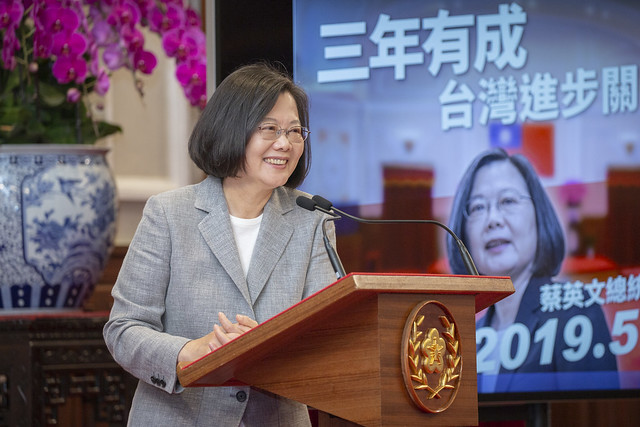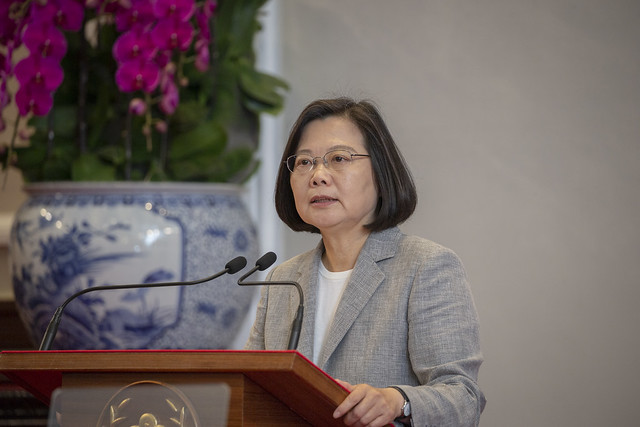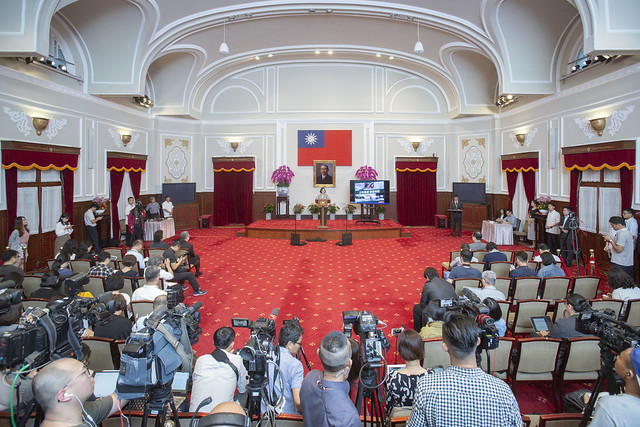News & activities
 News releases
News releases
President Tsai Ing-wen held a press conference on the morning of May 20 where she shared with the public her administration's achievements over the past three years and responded to questions from the media.
A translation of the president's remarks follows:
My fellow citizens and friends from the media: Good morning.
Today, it's pouring outside, so I hope everyone will be careful, and travel safely. I also asked Premier Su Tseng-chang (蘇貞昌) and the administrative team to make whatever preparations are necessary.
Today is the three-year anniversary of my inauguration, and I have a few thoughts that I'd like to share with you.
The day before yesterday, Saturday, construction finally began on Taiwan's first offshore wind farm. The propeller blades for the wind turbines are already at Taichung Harbor, waiting to be transported to the offshore installation platform for assembly. If everything goes smoothly, we will mark the next important milestone at the end of this year when the wind farm construction is completed.
We have talked about the dream of renewable energy for over 10 years. And in the three years since I took office, after amending laws, signing contracts, negotiating prices, and starting construction, we are finally making that dream a reality.
This is also the season for filing taxes, so I am sure that people really felt the extent of our tax cuts. Since taking office, former Premier Lin Chuan (林全) and I discussed that plan many times. From conception, through planning, legislation, to implementation, it took three successive premiers to get results that people can really feel.
Our experiences with wind power and tax reform tell us two things. The first is that this administration is not just thinking short-term, and is serious about long-term planning. The second is that it usually takes three years before an important policy shows results. But before it does, a leader has to endure isolation.
But I have to admit that over the past three years, I have endured a lot of pressure, and it rarely let up. But I'm confident that in my fourth year as president, we will all start to reap the benefits.
I will give you a few more examples. I endured three years of personal attacks because of pension reform. But the tradeoff is that the pension system won't go bankrupt for at least the next 30 years, so the government will have more resources to take care of more people.
The Forward-looking Infrastructure Development Program is another example. At the beginning, many people said it was worthless. But many of those same people are now reaping the benefits of our achievements. The next thing we will see is the completion of a series of infrastructure. At the same time, those projects will generate significant domestic demand that will support Taiwan's economic growth.
Especially given the ongoing US-China trade dispute, domestic demand will underpin stable growth in Taiwan's economy.
A few weeks ago, I presided over a groundbreaking ceremony for our indigenous submarine program's dedicated factory. All of our past presidents dreamed about building our own submarines, but during my administration, we have finally started to realize that dream.
I also recently participated in a ceremony to mark the shipping of our Formosat-7 satellite. So domestically manufactured satellites using Taiwanese R&D will provide the whole world with the most accurate meteorological data. Taiwan's space technology is also helping humankind observe images of black holes.
Those developments all reflect the "Three Years of Achievements" idea. They didn't just appear out of thin air. It took sustained, solid effort.
So I want to tell our friends who have been disappointed for the past three years: If you show just a little more patience, you will see that we have done far more than you imagined. And for those who have disparaged Taiwan for the past three years, I am telling you: You will be proved wrong.
Many friends who really care about Tsai Ing-wen feel that I have been foolish. The more I do, the more I get criticized. Our raft of long-term plans don't register in the short term. Other leaders wait for their second term to do things that might offend people, or don't do them at all. Only I, Tsai Ing-wen, do them in my first term.
But I have to say that what should be done, must be done. If you don't dare do them in your first term, you won't have the courage to do them in your second term. I paid a high political price. But if you just want me to focus on the short-term, this country will just be marking time, or even get weaker.
My only goal is to not let Taiwan get stuck in the past. The international political and economic situations are changing dramatically. So I have to lead the nation into the future.
Our efforts over the past three years have reversed the mistakes of the past. If we continue the Kuomintang (KMT) strategy of economic overreliance on China, then I want to ask: How can Taiwan survive the threat posed by a US-China trade war?
We are continuously helping Taiwan adjust its economic makeup, and have finally ushered in an era of explosive investment. Foreign firms have upped their investments. Taiwanese firms are eager to return. And investments from the special budget for our Forward-looking Infrastructure Development Program are driving growth in domestic demand. And the domestic demand created by urban renewal, long-term care, green energy, and defense industries will be the basis of our future economy and provide job opportunities for young people.
Over the past three years, we have done many things to redefine Taiwan. I want everyone to remember these 10 key concepts: increase pay, cut taxes; expand investments; upgrade industry; a nuclear-free homeland; green energy; pension reform; long-term care and childcare; social housing; national defense self-sufficiency; and defend sovereignty.
Together, these ideas reflect the biggest differences between the Taiwan of today, and the Taiwan of yesterday. They also paint a picture of Taiwan's future. Three years of toil, over a thousand days, have all been for this moment.
Maybe because our international situation is so difficult, Taiwanese lack confidence in themselves. Yet the international community has always believed in us.
With steady growth in Taiwan's economy, there will be more opportunities. The World Economic Forum has ranked Taiwan's overall economic stability No. 1 in the world, and our innovation capabilities No. 1 in Asia.
Because of the US-China trade dispute, "Made in Taiwan" (MIT) has once again become a popular keyword.
This is the overall goal for our nation's next stage: We don't want to just dust off the old MIT brand image. We want to build on that image to create an "MIT Upgrade" so that "MIT" doesn't just mean components or contract manufacturing. Instead, it will mean collaborating to create a new economic paradigm with the best production and lifestyle for the future of humankind incorporating artificial intelligence, green energy, and high technology.
So during my next term in office, I hope to hold a Taiwan Expo so that our friends around the world can see the comprehensive national power created by our MIT Upgrade.
Taiwan has so much world-leading soft power that we can show the international community.
One example is that thanks to AI-assisted machinery, the output value of Taiwan's machine industry has exceeded NT$1 trillion. The Internet of Things has also grown into "trillion-NT-dollar industries." We are also the supplier with the highest quality in the global ICT industry chain, and also hold a leading position in the biotech and pharmaceutical industries.
After three years of dedicated efforts, our green energy industries will drive almost NT$1 trillion worth of investments.
Domestic production of submarines and fighter jets will drive development of industry chains for national defense.
R&D for satellites will also spur strong growth in our space industries.
These developments are all part of Taiwan's future long-term competitiveness, and areas that will provide young people with job opportunities.
And most importantly—Taiwan is the most secure production base for information and communications products in the world.
Taiwan is also the world's most vibrant R&D base for high tech products.
At the same time, please don't forget that many countries are eager to learn from Taiwan's agricultural industries, culture, health care, education, and social welfare system.
The MIT brand image is getting stronger by the day. So I am sure that a Taiwan Expo can turn the whole world into Taiwan's customer, expand cooperative business opportunities in all sectors, and highlight Taiwan's soft power. Most importantly, a Taiwan Expo will highlight who we are as a nation, and our cumulative achievements over the past few decades.
To close, I want to say: Taiwan upholds democratic values, and economic self-determination and independence. Although we are a small country with a small population, we are a good country with good people. So I want to ask: How can we not be confident about our homeland? How could we ever hand our homeland over to someone else?
It is true. There's a powerful China on the other side of the Taiwan Strait, talking big about "one country, two systems." But we must bravely and even more loudly respond: We only have one country, and that is the Republic of China (Taiwan). We only have one system, which is democracy, freedom, and human rights.
Leading this country is the greatest honor of my life. Over the past three years, regardless of praise or criticism, I have led Taiwan forward. During my time in office, I will continue to bravely forge ahead, devoted to upgrading and transforming Taiwan, and fighting to the end for the security and wellbeing of the people of Taiwan.
President Tsai then fielded questions from the media. Responding to questions about strongly divergent opinions—and even antagonisms—within society about some ongoing policies, and how to further communicate and reduce tensions going forward, the president stated that Taiwan is a society with a diversity of opinions. But at the same time, it is a democratic society, and everyone who lives here has the ability to reason. So we will continue to communicate with the public. The president went on to say that she understands that it will take time to address these divergent opinions. For the past three years, the administration has dealt with some divisive issues, and after some setbacks and twists and turns, we were finally able to forge a majority consensus within society to address those issues. Using that same rationale, she believes that there are still many divisive issues in Taiwan society, and the most important thing is for the government to have the courage to face them and resolve them, and at the same time work at communicating with society. The worst thing that can happen is to leave these issues for our successors to deal with.
Commenting on cross-strait issues, the president pointed out that basically, Taiwan will continue to do all it can to maintain the cross-strait status quo of peace and stability. But since last January when China put such emphasis on the "one country, two systems model for Taiwan," that left us no room for ambiguity, and made it imperative that we state Taiwan's position firmly and clearly. "I want to say that again. What we are doing is stating Taiwan's position firmly and clearly. It is not a provocation." If a country's leader can't even clearly state the will of the people, how can that be considered a sovereign independent country?
When asked by a reporter about a press conference being held by the KMT at the same time to criticize her administration's performance over the past three years, and what her administration has done to review its own performance since November 24 of last year, President Tsai responded that since November 24, her administration has made a thorough review of its principal policies and considered what could be done to adjust or improve their implementation. And we have, in fact, adjusted and improved each of those policies, she said. Our overall direction has been correct, but we have also reexamined our policy implementation. After our new cabinet took office early this year, we moved quickly to make improvements and adjustments, and public satisfaction with our administrative team has continued to increase.
The president said she still clearly remembers that when she and former President Ma Ying-jeou met three years ago to complete their transition, he mentioned that pension reform couldn't wait any longer. She said we have been through a very difficult process to handle pension reform for military personnel, public servants, and public school educators together. Our pension reform ensures the pension system will remain solvent for at least the next 30 years. This will, in turn, ensure a degree of national fiscal stability for Taiwan, which means we will have more resources available to care for more people. If the KMT had begun addressing pension reform when it was in power, it would have been easier to handle, and measures could have been more moderate. The longer you postpone pension reform, she said, the harder it is to handle, and the bigger the price the country will have to pay.
President Tsai further stated the last time the KMT was in power, it left behind a lot of problems for its successor to handle. For example, she said, the previous administration's economic development policies for Taiwan, which were centered around China's market and economy, brought eight years of sluggish economic growth under KMT rule. But since coming to power, her administration has made adjustments to give Taiwan more economic autonomy, while continuing to improve Taiwan's investment climate. During her time in office, she said, we have seen a lot of foreign firms increase their investments in Taiwan, and a lot of Taiwanese firms have been coming back home. Investments in infrastructure have also allowed the Taiwan economy to generate its own growth momentum, and that momentum is growing.
When asked about what will drive Taiwan's economic growth over the last half of 2019, and the travel subsidies program for the latter half of the year, the president said there will be a lot of investments in Taiwan this year. In fact, we have been in the midst of a huge investment boom since last year, and we will take steps to speed up processing those investments so they can start contributing to actual economic growth as soon as possible. Taiwan's economic growth rate this year is forecast to reach about 2%, which among the four Asian Tigers will be relatively good.
Commenting on the travel subsidies program, President Tsai pointed out that encouraging private consumption is a high priority, and travel subsidies encourage citizens to travel domestically, which is very helpful to more than just the travel sector, and will have a positive impact on overall consumption.
In response to a question about dissatisfactions voiced by some people after the recent passage of the same-sex marriage law, and whether she worried about the possibility of a political backlash, the president stated that once a society reaches a certain point in its development, this issue is sure to come up. As a political leader, therefore, she is required to lead her administration to face the issue. During her three years in office, the issue of same-sex marriage has been much discussed, and even generated a certain degree of conflict, but after numerous twists and turns, including a constitutional interpretation by the Justices of the Constitutional Court and a referendum, disagreements on the subject have begun to narrow a bit. So the Executive Yuan was able to treat the constitutional interpretation and the referendum result as two major bases of an emerging social consensus integrating overall public opinion, and come up with a legislative proposal. That proposal was then forwarded to the Legislative Yuan for deliberations, during which further adjustments were made. In other words, the process has integrated many different views, and a lot of adjustments. She said the issue will no doubt continue to be discussed in Taiwan, and the way it is handled will be a test of Taiwan's level of maturity in dealing with divisive issues. It is true that our society has experienced difficulties, but the president expressed her belief that we have successfully negotiated one barrier and, although discussions will continue, our greatest difficulties are now behind us.
The president was also asked about recent media reports regarding her participation in a roundtable discussion with local business leaders, where she commented on certain legislative amendments and stated that the fact that laborers can't increase their income by working overtime has always caused her pain. The reporter who asked the question voiced the view that when the president was in the presence of management, her public statements tended to show partiality toward management's position. President Tsai responded that her remarks at the roundtable discussion that day had been somewhat mischaracterized. She was expressing sympathy that day with the predicament of laborers, rather than showing partiality toward management. In her recent travels around Taiwan, the president has been to places, especially in central and southern Taiwan, where many laborers have had their overtime hours cut due to the new labor regulations, and there are business owners who have been unwilling, due to high overtime pay, to let employees work overtime. As a result, laborers who used to be able to increase their income by working overtime now have fewer opportunities to do so. That is what she was commenting on. The president encourages business owners to give laborers opportunities to work overtime when overtime work is necessary, so that laborers won't see their income sharply reduced. That, she said, was the main point of her remarks.
Asked about how the younger generation will benefit from her policies, the president stated that her short-term approach is to rely on pay raises, tax cuts, and other coordinated measures to reduce the pressures faced by young people and maintain their disposable income at a certain level. But to achieve a fundamental solution, she said, we will have to change Taiwan's industrial structure so that Taiwan's industries can create high-quality job opportunities that generate wage growth for young people. That is the most important thing.
To illustrate her point, the president noted that some young employees at Google Taiwan are actually engaged in global R&D work, and not directed at just the Taiwan market, and when they do global R&D work they earn the same pay as that earned by young employees in other countries. Although working in Taiwan, their pay is set at global levels. This is a good example, she said, adding that she hopes Taiwan's industrial competitiveness will continue to improve and reach international standards, because pay in Taiwan would then move toward global levels, and be highly competitive.
The president mentioned that the large-scale migration of manufacturing enterprises to China in recent years has put a damper on pay levels in Taiwan because pay levels in mainland China for many years were lower than Taiwan's. But what we must do now, she said, is to achieve internationally competitive pay levels. And in order to move in that direction, the most important thing is that our enterprises must be internationally competitive.
Turning to the subject of indigenous affairs policies, President Tsai said the government has done a lot in the areas of education and culture, especially in the teaching of indigenous languages in schools. The government has funded the hiring of large numbers of indigenous language teachers so that indigenous children can learn their mother tongues in class. At the same time, the government also encourages these teachers and other experts to develop their own ideas on education and their own textbooks. That way they can assimilate into contemporary Taiwan society, while integrating indigenous traditions and heritage into teaching materials.
The president said that Taiwan's indigenous peoples are deeply concerned about a wide range of issues. They are the original inhabitants of Taiwan, she said, but later came to share Taiwan with more recent immigrants, so shouldn't we clarify the history of how they have been treated? To a certain degree, we must address their expectations regarding their rightful treatment as the original inhabitants of this land. Through the work of the Presidential Office Indigenous Historical Justice and Transitional Justice Committee, we have engaged in ongoing discussions and investigations of related issues. For example, thanks to the efforts of the Council of Indigenous Peoples, the Ministry of Economic Affairs, and other government agencies, all parties to disputes involving the mining activities of Asia Cement in Hualien County have sat down to discuss their concerns, and the results have been quite good. Taiwan has, indeed, created something of a model for how to address indigenous issues. The government takes a keen interest in the development of industry in indigenous villages and other places with significant indigenous populations, and will also continue to look after the needs of many indigenous peoples living in urban areas.
Also attending the press conference were Vice President Chen Chien-jen, Secretary-General to the President Chen Chu (陳菊), and Deputy Secretary-General to the President Liu Chien-sin (劉建忻).

